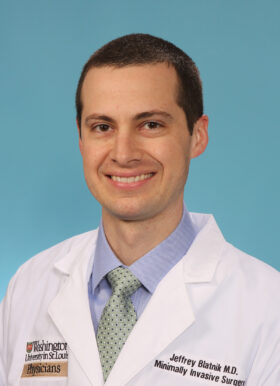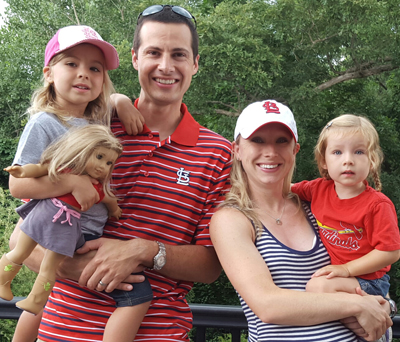Jeffrey Blatnik, MD

Jeffrey Blatnik, MD, specializes in minimally invasive surgery for abdominal wall hernia repairs.
Dr. Blatnik sees patients at:
- Center for Advanced Medicine, Gastrointestinal Center, 4921 Parkview Place, Suite 12B, St. Louis, MO 63110.
- Barnes-Jewish West County Hospital, Medical Building One, 1040 N. Mason Road, Suite 120.
Please call 314-454-8877 for an appointment.
What happened in the course of schooling to influence you to choose your specialty?
I was initially drawn to surgery in medical school at Case Western Reserve, after I was introduced to Dr. Mike Rosen, a specialist in hernia repair. He is a very charismatic physician who took me under his wing and became my mentor.
Dr. Rosen was a strong role model and spent a lot of time with me – letting me observe and operate with him. Hernias can be very debilitating, and while hernia repair surgery is not as glamorous as other types of surgeries, I saw how appreciative his patients were with the improvement in their quality of life.
I like that my practice is a mix of general surgery and minimally invasive laparoscopic surgery.
Did you always know you wanted to be a surgeon?
I’m the first one in my family to go into medicine, so I really had no idea in which direction to head. Surgery was my second rotation, everything just clicked, and I knew I wanted to be a surgeon. I’ve always been a hands-on person.
There is an instant gratification in surgery. A patient comes into the operating room with a problem and leaves the operating room with that problem usually being addressed. There is a lot of immediate feedback which you may not get with other specialties.

What brought you to Washington University?
My wife and I are both physicians and knew we wanted to work in academic medical centers. We were looking for a place that met the needs for both of us, and fortunately we were able to find that here at Washington University.
Also for me, my main focus is to improve the system with how we repair hernias and enhance the quality of care we give to our patients.
There is a group called the National Quality Collaborative. The goal of this collaborative is to track patients for the long-term in order to provide better care and outcomes, while reducing overall costs. Barnes-Jewish Hospital is in the process of joining other medical centers from around the country in the National Quality Collaborative.
There is a huge potential in the Barnes-Jewish system, and my ultimate goal is to bring surgeons together from other hospitals and surgery centers to weigh in on the process of repairing hernias, tracking our outcomes and finding ways to improve what we do. For example, there might be a surgeon in the community who fixes hernias better than any of us – but we don’t know because we don’t have any interaction with him or her.
Which aspect of your practice is most interesting?
Hernia repair surgery is one of the most common procedures performed by general surgeons. I’ve seen patients that have had multiple hernia repairs, and some are left in pretty bad shape. One of the most interesting aspects of my practice is repairing these recurrent hernias.
Hernias are rated on a scale of 1 to 10. Most hernias start as a 1 or a 2, but if not sufficiently corrected the first time (or second, or third), the recurrent hernia turns into a serious problem (7 or 8) that a specialist must repair.
With no way of tracking outcomes, the surgeon who did the initial repair might never be aware that his or her patient suffered recurrent and complicated hernias, and just assumes the patient is doing fine.
It is important to improve the quality of care after hernia repair in the short term (patient’s overall health and infections) and long term (recurrence).
What is a hernia and can someone live with a small hernia?
The easiest way to describe a hernia is a hole in the muscle. My focus is abdominal wall hernias, but hernias can occur in the groin, belly button or from a previous incision.
People live with small hernias all the time. If a hernia is discovered during imaging for another condition, but the patient is not bothered by it, there is nothing wrong with a watchful/waiting approach.
However, once a hernia starts to interfere with someone’s lifestyle – limiting movement, causing pain and discomfort, it is time to get it fixed.
Are there new developments in your field that you are excited about?
Mesh used in hernia repairs is a field that is constantly changing, and I tell people that mesh is a necessary evil in the world of hernias. There are a lot of new approaches to how meshes are designed – they might woven differently or made to be slowly absorbed over time. These changes in mesh may affect how we fix hernias in the future and improve patient outcomes down the road.
The world of robotics is also making a push into hernia surgery. While at this time there is a very small patient population that will benefit from this technology (those needing larger incisions), it has potential to improve outcomes by reducing the size of the incision, recovery time and pain for those patients.
Where are you from?
I was born and raised in Cleveland, Ohio. After college I returned to Case Western Reserve University in Cleveland for medical school, residency and my fellowship in minimally invasive/abdominal wall surgery.
I’ve spent a lot of time in northeastern Ohio, and am looking forward to the nicer (shorter) winters here. Cleveland tends have winter from October thru April!
Our family has adapted to St. Louis very quickly. There are plenty of cool and fun places to take our three children.
Is there a particular award or achievement that is most gratifying?
When I was a medical student, a lot of people took the time to teach me, and I appreciated that. During my residency, I won the resident teaching award multiple times – those awards were important to me because they showed my focus was not solely on surgery, but included teaching the residents and medical students along the way.
What is the best advice you’ve received?
The most useful advice is to know there will be good days and there will be bad days. It’s important to remember the days when your patients are appreciative and you are able to help them.
If you weren’t a doctor, what would you like to be doing?
I would be in the Caribbean operating a scuba diving company by day and relaxing on the beach by night. Scuba diving is my second hobby — I find it very peaceful and surreal under the water. Unfortunately, there is not much scuba diving you can do in the Midwest.